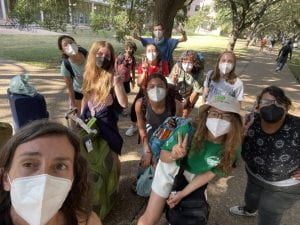Wow. Two weeks done. And I am so grateful to gave been able to experience this trip with such a fabulous group of TFBs.
Throughout these two weeks I have learned so much about the environment that we live in and the roles that we play it. Even though one is in water and one is on land, these two ecosystems share immense similarity. They both are home to large, biodiverse populations that are key for the health and success of our planet. Both have expansive amounts of organisms that reside within them, having perfected a balance of life and death for millions of years. There are processes that have been in plays since the beginning alongside these organisms ability to adapt and evolve quickly to ensure a world that is full of colorful life. Whether it was swimming in the coral reefs alongside the parrotfish and coral or hiking in the rainforest alongside the howler monkeys and scarlet macaws, it was eye opening to see how lively the natural world is without the touch of humans.
Even though we were given this amazing opportunity to see the beauty that still exists in untouched and protected areas, we were also shown the reality of the impact we have on these areas in our everyday habits. From throwing out trash without a second thought to driving to work everyday, we contribute to this negative impact everyday. Even though we were able to see some beautiful and healthy coral in the MPAs, we also were shown the reality of coral bleaching and disease. Whole areas of reef that were once plentiful with diverse corals and schools of fish are now drowned and choked by sargassum and other macro algae. We should not be able to clean up for an hour and collect more than 60kg of trash that included everyday items such as toothbrushes and flip-flops. Scarlet Macaw, Morelet’s Tree Frogs, and hundreds of other species are critically endangered because of our contribution of climate change and a need to make a profit off of their rarity. Deforestation is still a prominent problem that forests are facing and it’s not seeming like it’s going to slow down anytime soon. This trip opened my eyes to what these ecosystems were like before us and what they might become if we don’t step in and continue to fight for lives that don’t have the ability to fight for themselves. Despite the tragic truth of what humans are doing to this planet, we also got to hear from people who are trying to save it and reverse or at least slow down our affects. Hearing talks from Borris Avelaro and organizations like the Belize Fisheries Department have sparked a want to help in a direct and purposeful way in my mind and I am sure in the other TFBs minds as well. There are good people out there that are trying to help our planet as much as possible and are able to have a positive and lasting impact within peoples minds to inspire them to do the same.
This course exceeded my expectations in the best way possible. Coming into it, I knew it was going to be a fun and educating experience but I loved it even more than I thought I would. It was amazing being able to share these experiences with people who are interested in the similar studies and with whom everyone can totally geek out about what they’ve learned and share an excitement for learning new things and helping each other along the way. Being able to apply the processes of experiments and research outside of the classroom and have the ability to apply it in the field was awesome. I loved every minute but my favorite part was being able to be active (like snorkeling and hiking) while also being able to collect data and learn new things about our planet. In terms of what my least favorite parts of the course were, I have none. I guess the only thing that wasn’t great was waking up at 6:30am every morning, but I quickly realized that it was worth it so we could have more time to see even more cool things out in the field. To sum up the things that I have learned in this course that I will remember five, even ten, years from now is
1) As a TFB, you become very resourceful with the materials that you have in order to conduct experiments (aka peeing in a test tube in the name of science).
2) It is super cool to be able to learn and identify different taxa and the roles they play in their ecosystems as you are out in the field. It is also awesome when everyone collectively freak out about see leaf cutter ants going about their daily lives, minding their own business while we get to observe them and understand why they do what they do.
3) The tropical rainforests and coral reefs are insanely biodiverse ecosystems that play key roles in the planet and our own everyday success (in case I haven’t already mentioned that..), more than I believed prior to this trip. There are also so many different people who are trying to protect it and work together to save it, and I would love to join them in the near future to help continue their efforts.
Thank you Dr. Correa and Dr. Solomon for such a great opportunity to learn more about the natural world around us and experience what it’s like to be a true TFB. As I mentioned in my pre-departure blog, despite it being super cheesy, I love the Belize Babes and the new friends that I have made! Can’t wait for our reunion and I hope to hear about new taxa sightings that people see even outside of Belize 😉
– Sophia

